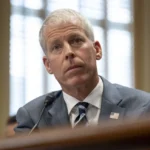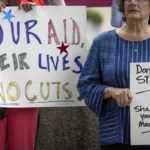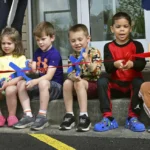Correcting the Juvenile Justice System in Wyoming
- Published In: Other News & Features
- Last Updated: Jan 22, 2022
Wyoming has a juvenile justice problem. We incarcerate more children per capita than almost every other state in the nation, and our youth suicide rate is among the highest as well. The Wyoming Legislature’s Joint Judiciary Committee of select Senate and House members continues to ask the hard questions and keeps finding no substantive answers from the State Advisory Council on Juvenile Justice — two state entities with a mouthful of words to their names but not a lot behind them. Although the Advisory Council has existed and been funded for more than two decades, we have nothing to show for it. We cannot even track how terrible we are. There is no detailed recordkeeping or statistical analysis.
Why do our kids stay in custody so long or choose to end their lives when Wyoming is supposed to be the final frontier? A place of beauty, solace and peace. You don’t have to know me long to know how passionate I am about this. But as much as we can complain, we should course correct the policy in Wyoming. The lives of these kids depend on it. What could we do statutorily?
The federal government gives Wyoming about $25,000 per year to run the Advisory Council, a governor-appointed board of 20-plus members representing all areas of the state who advise him and the legislature on juvenile justice issues. This money allows the council to meet four times per year, host a website and fund travel expenses. This money should immediately be redirected to recipient-based suicide awareness, counseling and treatment. It’s time we defund do-nothing bureaucrats and instead back evidence-based programming that prompt results and save lives.
The second solution is that fines for juveniles must be eliminated. Narina Nunez, a member of the council, testified that for most juvenile offenses, the court punishes them with fines. Is this effective? Is this strategy working and based in evidence? No, she conceded. The fines fall on the parents of the children, and this punishment is not tied to the outcome. There is not a family structure that helps this.
The council could be dissolved so that a data management company could handle the task at hand, which is managing and tracking the data relating to juvenile confinement and issues in a substantive fashion; that way, lawmakers can view it and act on it. If Wyoming doesn’t get rid of unfair juvenile fines, these monies could be redirected to pay for such an endeavor. In any event, the state of Wyoming must prioritize this issue and find the funding. Some things are simply worth paying for.
Joint Judiciary Committee Co-Chairman Jared Olson has pointed out to the committee members that the state distributes this money directly to local governments without earmarking it for certain activities. This begs the question: Are we spending juvenile dollars in unwise ways? If we aren’t analyzing the data and knowing what is going on, how can we be spending and running this responsibly? This money has failed to accomplish its statutory mission, and these funds should be better spent elsewhere for more cost benefit.
The highly publicized Tennessee Watkins podcast looked at the suicidal death of a Wyoming girl caught up in our juvenile system. Although emotional, it does pose the legal question about what does “incarceration” mean by state law and in terms of funding? What are the incentives to incarcerating our youth, if any? Wyoming operates four juvenile detention centers, and what does this mean for our state’s bottom line? These questions deserve harder looks and harder work.
Community involvement can’t be overlooked. Washakie District Attorney John Worrall has testified to the legislature’s Joint Corporations Committee that the “single point of entry is extremely critical. … I’m a big believer in it.” Single point of entry means that only a prosecutor can decide whether to charge a youth in juvenile or adult court. Worrall discussed at length that he often meets with members of the Youth Alternatives program. That program is successful because it has organization and invested individuals. However, one problem, Worrall noted, is that the city prosecutor doesn’t attend these meetings even though invited. I believe the legislature should consider the policy move of requiring the attendance of someone from those offices if they want to receive funding and access to a program that is critical for the diversion and reinvestment of our youth.
One problem that we must immediately work to correct is the socioeconomic barrier that is clear and preventative, and most importantly, discriminatory. It has no basis for existence in any modern legal system. One example was illustrated in testimony that described situations in which parents are unwilling or unable to make payment efforts on behalf of their child. “Parents have to pay for diversion programming, and some parents simply won’t pay,” Worrall told the committee in testimony. Even though this would allow their child to have an expunged record, some parents simply cannot afford it. This is an unfair burden upon those who can least bear it.
One suggestion for data was discussed by Worrall. He recommended we consider utilizing the Justice Information System used by the Wyoming Department of Criminal Investigation that may be able to track this.
State Sen. Ed Cooper asked if our system is broken and needs to be fixed. Worrall said things can be improved. Consistency between the counties is one of them. Every county is different, he said. In short, our counties aren’t required to produce complete data about what is happening to these kids so it cannot be analyzed by policy makers and available to the public.
We need to ask significant questions and have accountability metrics and oversight to overcome this disaster. Wyoming must not continue to be so lackadaisical about the future of our youth. We cannot lose sight of the importance of a young person’s most formative years. Government support for juveniles and families must help, not scare and traumatize, them.
The real missing component in government always seems to be the sake of humanity. When people in power are only driven by egos and bottom lines, people suffer. The state’s Joint Judiciary Committee has no shortage of credentials and degrees and accolades. However, let’s not lose sight of the real problems and lives that hang in the balance. This is a bet we can’t stand to lose.













